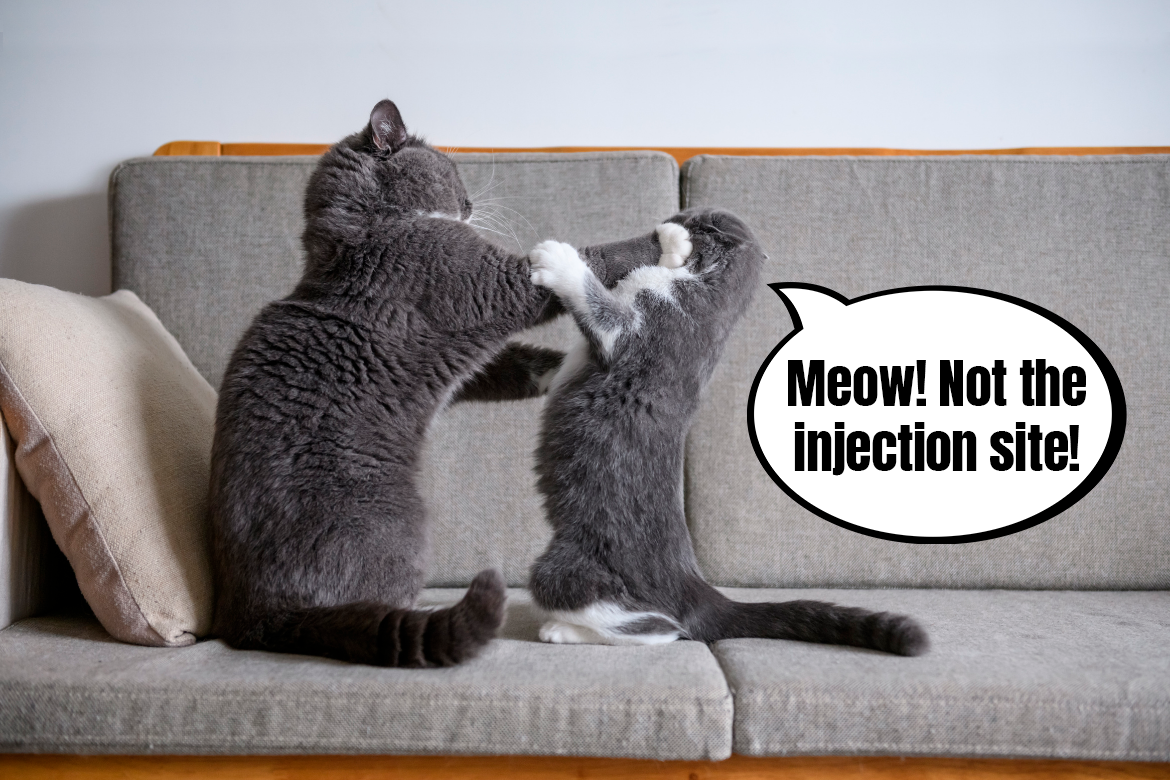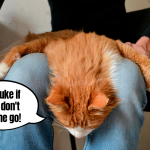“Meow! Why did you leave me with that hooman who pokes needles into me, again” – shouted the cat, coming back with his Guardian from the vet clinic. – “Go vaccinate yourself, hooman, if you’re a masochist. I’d rather stretch on my scratcher and observe the world from afar.” A scene like this probably plays out in every cat’s head once they discover they’ve allowed themselves to be fooled again and went into the travel crate that leads straight to the vet office, on the promise of getting some tasty treats. “For fluffs sake!”
For us, cat Guardians, sometimes a lightbulb goes off in our heads. Does a cat need to be vaccinated if they’re always indoors, don’t have contact with other animals and are generally healthy? What’s the risk of them catching a cat-specific infection, if they’ve never met another cat? Today, dear fabCats, we’ll try to dig out some information on that and cover some hurtful myths with a thick layer of cat litter.
Note that depending on your region, the recommendations for cat vaccinations may differ.
Kitten’s first vaccinations
In the first weeks of their lives, kittens get their immunity from their mother’s milk. By living inside their small, protective family bubble with their siblings, kittens can grow up slowly and get stronger each day. However, the composition of the mother’s milk changes over time and the immunity is starting to be built by the kitten’s body alone, strengthened by vaccinations that are administered to them at a young age. According to the current veterinary schemes, first shots should happen around 8-10 weeks of age (not earlier than the 7-8 week mark), so that the antibodies produced thanks to the mother’s milk don’t neutralize the vaccination.
Up to the 16-17 week mark, kittens should get 3 rounds of the basic vaccine against herpes virus type 1, calicivirus and panleucopenia felina. Those are the three hardest and most tragic infections that can bring many kittens and adult cats over the rainbow bridge each year. Because of that, the basic vaccination is repeated after 1 year and after that, every 2-3 years, depending on the vaccination program at your vet clinic.
What infections can indoor cats catch?
Among some cat Guardians there’s still the opinion that indoor cats don’t need vaccinations. Let’s start with debunking the myth that such cats are fully protected against infections as they’re staying at home at all times and don’t have contact with other animals. There is some truth here – indoor cats have a lower risk of catching some infections, but lower doesn’t mean it’s a zero chance situation. And because of that, it’s not true that deworming treatments and vaccinations are completely redundant for indoor cats. Why?
Let’s meow out a scene here. You, fabCat, are going shopping to the nearest pet store for your kitty’s favourite food. They deserved it – after all, they let you sleep half an hour longer on a Sunday! On your way there you’re taking a shortcut, through the grass, meeting a neighbour with his dog on a walk. You stop to talk and then you’re on your way again – soon enough your kitty is ready to meet you at the door with the awaited surprise. They’re doing circles around your legs, rubbing, waiting for the dessert. In the meantime they’re sniffing your shoes too – after all you’ve brought some new smells from the big world. So exciting!
And now let’s think about how much bacteria and microorganisms you could’ve brought with you on your shoes after such a walk. Through the grass, where the neighbours dog and all the neighbourhood dogs have taken a dump. The grass where birds are happily jumping around to catch the worm in the morning. Bacteria and viruses can get onto your shoes even if you were just walking on the sidewalk – nobody ever disinfects the entire outside world every day, do they? And it’s the seemingly non-existent, invisible bacteria and viruses brought home on your shoes that can be harmful to your cats.
Dangerous cat infections
So what can get caught on your fabCat shoes? Many unpleasant things. Like the parvovirus or panleucopenia felina virus – two of the most dangerous cat infections that can survive in the environment for an entire year without a host. All it needs is for a sick animal to poop on the grass or the pavement. It doesn’t even matter if the dump is cleaned away, decomposes naturally, you step in it or you’ll walk through a place where it once was. Viruses are invisible to the naked eye, but they do exist. It’s the same case for eggs of tiny parasites.
If your cats like playing with shoes, sleep on the doormat or are not regularly vaccinated and tested for worms, potential health issues can stay invisible and show symptoms when it’s already a serious infection. It’s better to play it safe and go not only for the necessary injections when the cat is still a kitten, but also for the repeated ones on the later stages of a cat’s life. Which ones will be the most necessary?
Mandatory cat vaccines – what and when?
The basic vaccine (calicivirus, herpesvirus, panleucopenia felina) should be repeated a year after the date of the first shot and later, for indoor-only cats, every 2-3 years. For cats who do go outdoors or have contact with other animals, the vaccines may be needed more frequently. The injection is administered after discussing it with a vet, doing the general health check and deworming the cat. Each kitty, regardless of their lifestyle, should be regularly vaccinated – the three infections mentioned above and the viruses that cause them are common and have a great risk of serious complications.
Additional vaccinations for a cat that are worth to remember
Besides the basic vaccines, after discussing it with your vet and based on your cat’s lifestyle, it might be advisable to introduce some additional vaccinations to prevent health issues. These could include FeLV and rabies.
If cats live in a bigger community, go outside or have close contact with outdoor cats, are supposed to travel abroad, live in an environment with a higher risk of infections (e.g. in a shelter) or are going to be companions to an already diagnosed and ill cat, additional vaccines for FeLV or rabies may be necessary.
– “Meow. I get it now” – said the cat, going back to his thoughts. “I will never give up on sniffing your shoes, especially when you’er coming back from feeding the community cats and bringing so many interesting smells with you! Go ahead, vaccinate. I won’t be looking. Just know that I’ll be waiting for a purrrfect reward for a brave patient who endured those injection tortures with dignity”.
Did your cats visit the vaccination center this year, fabCats? In those hot pandemic times we hear a lot about hooman vaccinations, but we should remember about our furry friends as well. And if you’re not sure if it’s time yet, your cat’s health book will meow you the truth. Sending fabCat hugs to you and wishing all cats and kittens a 100% health!




